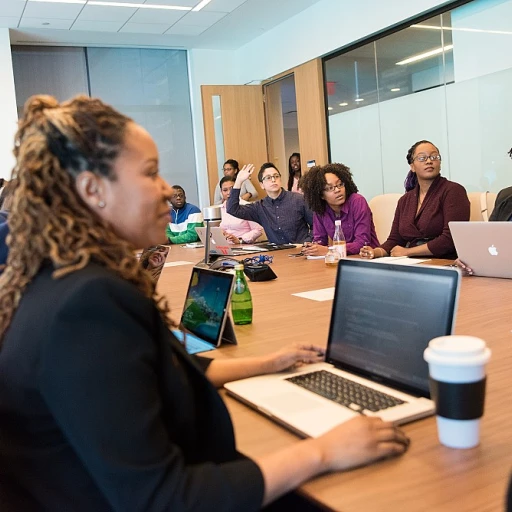
Understanding the Role of a Chief Human Resources Officer
The Multifaceted Role of Leadership in HR
The Chief Human Resources Officer (CHRO) occupies a pivotal position within any organization, bearing the responsibility to drive the strategic vision for human capital. As both a leader and a strategist, the CHRO must expertly navigate a dynamic landscape, steering organizational change while ensuring employee satisfaction and productivity. The imperative to understand and implement effective strategies, such as those explored in crafting an effective workplace skills plan, is crucial for a successful HR leadership role.
Balancing Strategy and Empathy
The role requires a delicate balance between strategic foresight and emotional intelligence. The integration of comprehensive training platforms, like Traliant, plays a significant role in equipping CHROs with the necessary tools to enhance compliance and foster an inclusive workplace culture. Compliance training, such as courses dealing with preventing discrimination and sexual harassment, is essential, not just for legal protection but also for cultivating a respectful work environment.
Navigating Ethical Complexities
Alongside strategic initiatives, CHROs must also address the ethical complexities inherent within the workplace. Training employees on unconscious bias and bystander intervention can significantly contribute to nurturing equity and inclusion. In this vein, story-based harassment prevention courses help solidify understanding and ensure retention of critical principles among staff.
Essential Skills for Effective HR Leadership
Core Competencies for Successful HR Leadership
To excel in the role of a Chief Human Resources Officer, certain skills are crucial for navigating the complexities of modern-day workplaces. These competencies not only bolster effective management but also foster a thriving, inclusive workforce. Here are a few key skills:
- Strategic Thinking: Successful CHROs demonstrate a keen ability to align HR strategies with broader organizational goals, ensuring that human capital initiatives support long-term success.
- Strong Communication: Effective communication is vital for addressing workplace issues such as harassment and discrimination. Clear messaging aids in delivering compliance training and establishing a strong code of conduct.
- Knowledge of Compliance and Regulatory Frameworks: A thorough understanding of regulations regarding workplace harassment, preventing discrimination, and active shooter protocols is essential for preventing legal issues and fostering a safe work environment.
- Empathy and Emotional Intelligence: These qualities are essential for recognizing and addressing unconscious bias, promoting inclusion, and ensuring that interventions like bystander intervention training are effective.
- Leadership in Diversity, Equity, and Inclusion (DEI): CHROs should champion diversity equity and inclusion initiatives, striving to create a workplace that embraces diversity and fosters an inclusive culture.
- Training and Development Expertise: Experience in deploying training programs, such as Traliant’s harassment training and bias intervention courses, ensures a well-informed workforce that adheres to ethical standards.
Emphasizing these skills in human resources strategy and operations positions CHROs to lead with authority, cultivate a positive organizational culture, and proactively manage challenges in the dynamic landscape of HR leadership.
The Impact of Traliant Training on HR Leadership
Optimizing Leadership through Strategic Training
Harnessing the proper training resources is vital for chief human resources officers aiming to hone their leadership skills and build impactful HR departments. Traliant's training programs offer a variety of courses that embed crucial elements like compliance, diversity, equity, and inclusion into the HR framework, thereby enhancing leadership acumen. These training programs focus on the following aspects:- Compliance and Ethics: Staying updated with workplace compliance ensures HR leaders can effectively guide teams through ethical practices and uphold a code of conduct. Traliant provides story-based compliance training that integrates real-life scenarios to underscore the importance of ethics in the workplace.
- Preventing Harassment and Discrimination: Harassment training is pivotal in creating a safe and inclusive work environment. Programs on preventing workplace harassment and discrimination harassment actively help HR leaders to preclude any form of misconduct.
- Addressing Unconscious Bias: Traliant courses shed light on unconscious bias and intervention training, which support HR leaders in fostering an open culture, where diversity and inclusion can flourish. This aids in avoiding biases that may inadvertently influence decision-making.
- Bystander Intervention: Interventions are crucial in mitigating scenarios that might escalate to workplace harassment. Training in bystander intervention empowers employees and HR leaders to intervene appropriately and effectively.
Building a Culture of Compliance and Ethics
Fostering an Environment of Compliance and Ethical Practices
Building a culture of compliance and ethics is paramount for Chief Human Resources Officers (CHROs) aiming to enhance organizational leadership. This involves implementing comprehensive training programs that educate employees on compliance, workplace harassment, and ethical standards. The integration of tailored courses, such as harassment prevention and discrimination workplace harassment training, can significantly raise awareness and reduce incidents of misconduct. Incorporating story-based courses tailored to preventing workplace harassment and diversity equity inclusion programs can effectively engage employees, making them more likely to retain critical information. This kind of training empowers employees to recognize situations involving unconscious bias or potential sexual harassment, equipping them to take necessary bystander interventions. Another critical aspect includes establishing a robust code of conduct that clearly communicates organizational values and expectations regarding employee behavior. Compliance training, such as Traliant's course offerings, helps in embedding these values across all levels of the organization, transforming theoretical knowledge into practical applications. To further promote an inclusive and equitable work environment, it's essential to incorporate DEI training initiatives. These initiatives help manage unconscious biases and encourage diversity inclusion, which are fundamental components of compliance and ethical practices. In conclusion, by aligning training programs with organizational values and ensuring that all employees are equipped to handle workplace challenges, CHROs can foster an ethical culture. This approach not only prevents discrimination and harassment but also enhances overall workplace harmony.Navigating Change Management
Adapting to Change in the Modern Workplace
In today's rapidly evolving business environment, Chief Human Resources Officers (CHROs) must adeptly navigate change management to ensure organizational resilience. The ability to manage change effectively is crucial for maintaining a productive and harmonious workplace. This involves not only implementing new policies and procedures but also ensuring that employees are prepared and supported throughout the transition.
Leveraging Training for Smooth Transitions
Training plays a pivotal role in equipping employees with the skills needed to adapt to change. Programs like Traliant's compliance training courses can help CHROs foster a culture of continuous learning and adaptability. These courses cover essential topics such as preventing workplace harassment, unconscious bias, and diversity inclusion, which are integral to creating an inclusive and compliant work environment.
Building a Culture of Inclusion and Compliance
Effective change management also involves building a culture of compliance and ethics. By integrating harassment prevention and bystander intervention training, CHROs can ensure that employees understand the importance of maintaining a respectful and inclusive workplace. This not only helps in preventing discrimination and harassment but also reinforces the organization's commitment to diversity, equity, and inclusion (DEI).
Addressing Resistance and Encouraging Engagement
Resistance to change is a common challenge that CHROs face. To address this, it is essential to engage employees through open communication and active participation in the change process. Story-based training modules can be particularly effective in illustrating the benefits of change and encouraging buy-in from employees. By fostering an environment where employees feel heard and valued, CHROs can mitigate resistance and promote a smoother transition.
Ensuring Long-term Success
Ultimately, successful change management requires a strategic approach that aligns with the organization's long-term goals. By prioritizing training and development, CHROs can ensure that their teams are well-equipped to handle future challenges. This proactive approach not only enhances organizational agility but also strengthens the overall leadership capabilities within the HR function.













